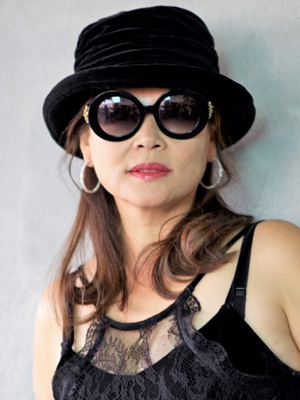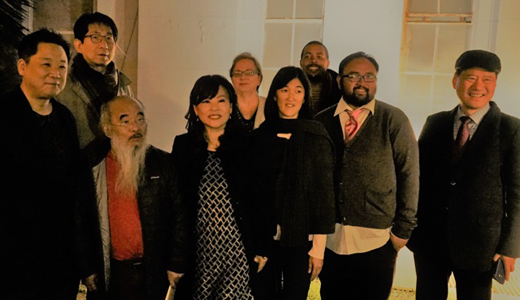On Tyranny Street Installation, the Handmaid’s Tale Trailer, and More
San Francisco Renaissance poet Joanne Kyger has died; 2017 Anisfield-Wolf Awards announced; what makes poetry poetry; and more.
Jump to navigation Skip to content
San Francisco Renaissance poet Joanne Kyger has died; 2017 Anisfield-Wolf Awards announced; what makes poetry poetry; and more.
The Cleveland Foundation has announced the winners of the 82nd annual Anisfield-Wolf Awards, given annually for books of poetry, fiction, and nonfiction published in the previous year that “confront racism and examine diversity.” The winners will be honored at a ceremony in Cleveland on September 7.
The winners are Tyehimba Jess in poetry for Olio (Wave Books), Margot Lee Shetterly in nonfiction for Hidden Figures: The American Dream and the Untold Story of the Black Women Mathematicians Who Helped Win the Space Race (William Morrow), and Peter Ho Davies and Karan Mahajan in fiction for The Fortunes (Houghton Mifflin Harcourt) and The Association of Small Bombs (Penguin), respectively. Isabel Allende received the Lifetime Achievement Award. Jess, Shetterly, and Allende will each receive $10,000; Davies and Mahajan will split the $10,000 fiction prize.
“The new Anisfield-Wolf winners broaden our insights on race and diversity,” said Henry Louis Gates Jr., who chairs the jury. “This year, we honor a breakthrough history of black women mathematicians powering NASA, a riveting novel of the Asian American experience, a mesmerizing, poetic exploration of forgotten black musical performance and a spellbinding story of violence and its consequences. All is capped by the lifetime achievement of Isabel Allende, an unparalleled writer and philanthropist.” Gates, along with Rita Dove, Joyce Carol Oates, Steven Pinker, and Simon Schama, judged the prize.
Established in 1935, the Anisfield-Wolf Book Awards have honored 236 writers, including Nobel laureates Gunnar Myrdal, Nadine Gordimer, Martin Luther King Jr., Toni Morrison, and Derek Walcott.
Whiting Award winners announced; Fonograf Editions releases vinyl records of poetry readings; inside the Merriam-Webster dictionary; and other news.
In a 2010 panel discussion at the Paley Center, Chinese activist and artist Ai Weiwei spoke about his extensive use of Twitter to share about his art and activism. Pressuring Twitter cofounder Jack Dorsey to make Twitter’s web interface available in Chinese, Ai stated how well suited it is to the Chinese language, in which each character constitutes an entire word: “With 140 characters in Chinese you really can write a novel.” Taking inspiration from this discussion, write a series of flash creative nonfiction pieces about art, human rights, or the use of social media, each 140 words long. Later, you may want to decide whether the essays function as standalone pieces or a connected series.
“The thing when you write about pop culture—especially pop culture that you’re interested in—that you have to avoid, is just saying ‘isn’t this cool?’ again and again...I realized that I needed to put myself into it.” Elena Passarello talks about writing creative nonfiction and reads from her first book, Let Me Clear My Throat (Sarabande Books, 2012). Passarello’s Animals Strike Curious Poses (Sarabande Books, 2017) is featured in Page One in the March/April issue of Poets & Writers Magazine.
Amazon’s new ratings-based bookstore in Chicago; the mystery of the steak-sauce bottles in the library; the rise in aliteracy, or “reader’s block”; and more.
Tonight at a ceremony in New York City, the Whiting Foundation announced the winners of the 2017 Whiting Awards. Among the largest monetary prizes given to emerging writers, the annual awards are given in poetry, fiction, nonfiction, and drama. Each winner receives $50,000.
This year’s winners are Simone White and Phillip B. Williams in poetry; Kaitlyn Greenidge, Tony Tulathimutte, Jen Beagin, and Lisa Halliday in fiction; Francisco Cantú in nonfiction; and Clare Barron, Clarence Coo, and James Ijames in drama.
Visit the Whiting Foundation website to read more about the awardees. Excerpts from the latest work of each winner are available at the Paris Review.
Established in 1985, the Whiting Awards aim to “identify exceptional new writers who have yet to make their mark in the literary culture.” More than $7 million has been awarded to 320 emerging writers since the award’s inception. “The prize offers the gift of radical freedom to writers with the talent and imagination to match it,” said Courtney Hodell, the foundation’s director of writers’ programs.
Previous winners have included Tracy K. Smith, Jeffrey Eugenides, Jorie Graham, Elif Batuman, Alice Sola Kim, and Ocean Vuong.
The award is not open to submissions; an anonymous group of writers, editors, agents, critics, professors, booksellers, and other literary professionals are selected by the Whiting Foundation each year to nominate writers and serve as judges for the awards. Visit the Whiting Foundation website for more information.
Top row, from left: Phillip B. Williams, Simone White. Middle row: Tony Tulathimutte, Lisa Halliday, Clare Barron, Kaitlyn Greenidge. Bottom row: Francisco Cantú, Jen Beagin, James Ijames, Clarence Coo.
Robert Silvers, founding editor of the New York Review of Books, has died; Houghton Mifflin Harcourt lays off staff; the political appropriation of Jane Austen; and other news.
Tanya Ko Hong explores both cultural and personal experiences with her writing, and seeks to bridge the gap between first-generation Korean immigrants and their Korean American children through her bilingual works. She has been published in Rattle, Beloit Poetry Journal, Two Hawks Quarterly, Portside, Cultural Weekly, Korea Times, and Korea Central Daily News. She has an MFA in creative writing from Antioch University in Los Angeles, and is the author of four books, including Mother to Myself (Prunsasang Press, 2015).
 On a chilly January evening, the Korean language reverberated through the Poet’s Garden at Beyond Baroque in Venice, California for the “Bittersweet: The Immigrant Stories” event. In all the mainstream poetry readings I’ve attended, the voices of these first-generation immigrants have been absent. Many immigrants want to express themselves but cannot due to language, social, and cultural barriers. In the Korean writer circles, the few who give voice to the immigrant experience aren’t even confident that their stories are worthy of translation or performance in English. Without translation, these original stories are in danger of dying out with the immigrant generation. I want to prevent that. As Toni Morrison said, “If there is a book that you want to read, but it hasn't been written yet, you must be the one to write it.”
On a chilly January evening, the Korean language reverberated through the Poet’s Garden at Beyond Baroque in Venice, California for the “Bittersweet: The Immigrant Stories” event. In all the mainstream poetry readings I’ve attended, the voices of these first-generation immigrants have been absent. Many immigrants want to express themselves but cannot due to language, social, and cultural barriers. In the Korean writer circles, the few who give voice to the immigrant experience aren’t even confident that their stories are worthy of translation or performance in English. Without translation, these original stories are in danger of dying out with the immigrant generation. I want to prevent that. As Toni Morrison said, “If there is a book that you want to read, but it hasn't been written yet, you must be the one to write it.”
Since there didn’t seem to be an event celebrating the works of immigrants, I knew I had to do it. Why should my fellow immigrant artists feel invisible, voiceless, and unworthy? This evening was the realization of my dream to celebrate their works with a multicultural audience. Light evening breezes tossed the overhead string of lights as eleven artists shared immigrant experiences of Korean, Mexican, Filipino, and other cultures. Korean poets read selections as originally written, and then American poets read the translations.
Heard in English for the first time, “Sugarcane Arirang” by So Hyun Chang, recounted the first Korean Americans’ long days in the sugar fields of Hawaii. In Korean, the refrain of “Arirang” conveyed the rhythm of life in the fields and longing for home. The translation spoke of the raw and emotional experience. It was not a coincidence that the event date coincided with the one hundred and fourteenth anniversary of the first documented Korean immigrant’s arrival in Hawaii. The bittersweet aspect of the evening was the truth of the immigrant experiences and generational differences, which had been kept in silence for so long.
At the end of the evening, I read “American Dream” in both Korean and English, which ends with the question, “Who am I to you, America?”
The chill of the night was replaced by the warmth of friendship as we physically huddled together to conserve heat. The audience included writers who seldom venture outside of the Korean community, let alone to a Los Angeles venue like Beyond Baroque. The shared laughter and tears began to dismantle the barriers, borders, and fences of race, language, culture, gender, and age that often keep us divided.
On April 29, 2017, I will cohost an event at Beyond Baroque to commemorate the twenty-fifth anniversary of the Los Angeles riots, an upheaval shared by Angelinos across cultural lines but seldom discussed today. As with “Bittersweet,” my goal is to bring voices to the shared pain and anguish of our neighboring communities. Let us express and listen to each other. We have suffered in silence too long.
 I thank all the participants; my cohost Julayne Lee; and the artists So Hyun Chang, Alexis Rhone Fancher, Christine Gonzalez, liz gonzales, June C. Kim, Soo Bok Kim, Duk Kyu Park, Kuya Paul, and Hiram Sims for making “Bittersweet” such a special night.
I thank all the participants; my cohost Julayne Lee; and the artists So Hyun Chang, Alexis Rhone Fancher, Christine Gonzalez, liz gonzales, June C. Kim, Soo Bok Kim, Duk Kyu Park, Kuya Paul, and Hiram Sims for making “Bittersweet” such a special night.
Special thanks to Beyond Baroque and their director, Richard Modiano.
Major support for Readings & Workshops in California is provided by the James Irvine Foundation and the Hearst Foundations. Additional support comes from the Friends of Poets & Writers.
Photo one: Tanya Ko Hong (Credit: Alexis Rhone Fancher). Photo two: The Immigrant Stories readers: (front, left to right) June C. Kim, So Hyun Chang, Tanya Ko Hong, Julayne Lee, Kuya Paul, and Soo Bok Kim. (back, left to right) Duk Kyu Park, Christine Gonzalez, and Hiram Sims (Credit: Patrick Hong).Michelle Dean on the art of paying attention; young-adult novels and the Black Lives Matter movement; how Goodreads is changing the book market; and other news.